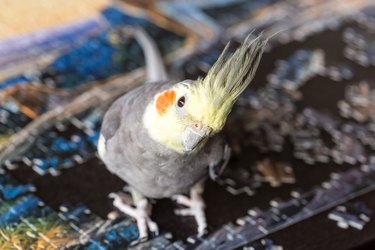
Those flashing eyes your cockatiel keeps darting at you could be a sign of how much your pet bird adores you, according to Mickaboo Companion Bird Rescue — or it could be a sign that she's fed up with your company. Although some cockatiels can learn short phrases like "I love you," knowing cockatiel signs of affection is a more reliable way to discern your bird's feelings towards you.
Read cockatiel body language
Video of the Day
If your cockatiel feels threatened by you or doesn't like you for whatever reason, he won't be afraid to show it. Some telltale signs that your feathered friend feels your relationship needs work include:
Video of the Day
- Rolling on their back, claws extended and beaks open to bite.
- Tail fanning with flashing eyes.
- Crouching with head forward, body tense, neck feathers up, and tail feathers spread.
- Marching toward you with head down in an aggressive manner.
- Biting — usually the last resort when you've ignored the clues.
On the other hand, there are things that your bird might do to show that she's relaxed and comfortable around you, which you can take as evidence she likes you.
- Preening your hair — cockatiels groom one another as a sign of affection
- Tail wagging with flashing eyes — they're excited and might even be "flirting"
- Crouching with head forward, body relaxed head feathers up (as opposed to the above description, where the body is tense) — your bird is asking to be petted or scratched
- Marching toward you with head up — an invitation to play, pet, or preen because they're pleased with having your company
- Regurgitating — the ultimate sign of affection, your bird wants to feed you because it's chosen you as its mate
Listen to its voice
Just because you've trained a bird to say "I love you" doesn't mean that is how it feels. Learn the sounds cockatiels make when they're not happy to save yourself from a nasty bite:
- Hissing — a warning that your presence isn't welcome
- Beak clicking — often accompanied by a raised foot that warns you to stay back
- Growling — leave your bird alone to calm down, especially if your bird raises its neck feathers, or you might get bitten
Other sounds your bird makes are verbal indicators that it feels comfortable and delighted when you're around. Here are some happy cockatiel sounds and what they mean.
- Purring — a purring bird is just as content as a purring cat
- Tongue clicking is common in cockatiels. It's their way of saying that they're friendly and won't hurt you.
- Singing, whistling, and chattering are all signs your bird is content in your presence
Read its mood
Just because your cockatiel is agitated and noisy doesn't mean it doesn't like you. It could be reacting to your mood or something else going on in the environment. Even introducing an unfamiliar toy or perch into its cage can increase its anxiety, according to Bird Health.
In a 2018 study published in PLOS One, cockatiels reacted strongly to hearing distress calls from other birds. The reactions — raised crest, agitated body movements, and vocalizations — were particularly strong when the distress call was from a bird it had a bond with.
If your bird often seems agitated, try moving it to a less busy location in your home where it will feel more secure. Spend time with it doing calm, enjoyable activities such as hand-feeding or stroking it gently. Once your bird feels relaxed and confident in its surroundings, you'll probably start seeing those cockatiel bonding signs in your pet.